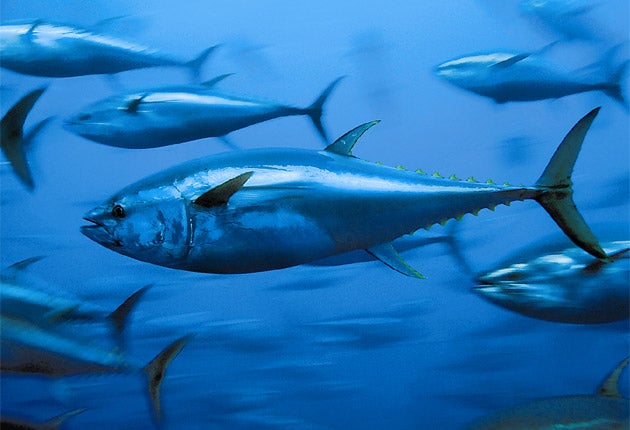Revealed: the bid to corner world's bluefin tuna market
Mitsubishi freezing fish to sell later as stock numbers plummet toward extinction

Your support helps us to tell the story
From reproductive rights to climate change to Big Tech, The Independent is on the ground when the story is developing. Whether it's investigating the financials of Elon Musk's pro-Trump PAC or producing our latest documentary, 'The A Word', which shines a light on the American women fighting for reproductive rights, we know how important it is to parse out the facts from the messaging.
At such a critical moment in US history, we need reporters on the ground. Your donation allows us to keep sending journalists to speak to both sides of the story.
The Independent is trusted by Americans across the entire political spectrum. And unlike many other quality news outlets, we choose not to lock Americans out of our reporting and analysis with paywalls. We believe quality journalism should be available to everyone, paid for by those who can afford it.
Your support makes all the difference.Japan's sprawling Mitsubishi conglomerate has cornered a 40 per cent share of the world market in bluefin tuna, one of the world's most endangered fish.
A corporation within the £170bn Mitsubishi empire is importing thousands of tonnes of the fish from Europe into Tokyo's premium fish markets, despite stocks plummeting towards extinction in the Mediterranean.
Bluefin tuna frozen at -60C now could be sold in several years' time for astronomical sums if Atlantic bluefin becomes commercially extinct as forecast, a result of the near free-for-all enjoyed by the tuna fleet.
In the forthcoming documentary film The End of the Line, Roberto Mielgo, a former bluefin fisherman who travels the world monitoring catches, claims that Mitsubishi buys and sells 60 per cent of the threatened fish and that it has expanded its freezer capacity to hold extra bluefin.
Mitsubishi acknowledges that it freezes bluefin, but only, it says, to even out peaks and troughs in supply.
"Mitsubishi Corporation handles between 35 per cent and 40 per cent of Atlantic and Mediterranean bluefin tuna imported to Japan," the company told The Independent.
"As we explicitly explained to the makers of the film, the fishing season for bluefin tuna in the Mediterranean is very short, making it necessary to freeze tuna to provide customers with stable supplies throughout the year."
Fish stocks across the world are in retreat because of over-fishing. One study suggests oceans will be stripped clean of all fish by 2048. Bluefin is imminently at risk of commercial extinction. The wildlife charity WWF forecasts that breeding stocks of the fish that migrate from the Atlantic to spawn will be wiped out in the Mediterranean by 2012.
Although the legal bluefin catch is set at 22,000 tonnes, conservationists suspect the actual catch is 60,000 tonnes, four times the maximum that marine scientists recommend. After studying catches and sales, Charles Clover, the environmental journalist behind the film The End of the Line, believes that businesses involved in the ransacking are deep-freezing 20,000 tonnes of bluefin a year for later use.
He hopes his film will galvanise the public about over-fishing in the same way Al Gore's An Inconvenient Truth mobilised opinion against climate change.
British retailers and chefs will not stock bluefin because it is so endangered. However, as disclosed in The Independent last week, the Japanese restaurant Nobu continues to serve it – while advising diners to choose a dish that is less environmentally damaging.
The fisheries body responsible for numbers, the International Commission for the Conservation of Atlantic Tunas (ICCAT), sanctioned a bluefin catch of 22,000 tonnes this year in defiance of its own scientists who advised no more than 8,500-15,000 tonnes.
WWF said the decision was a "disgrace". In fisheries circles, ICCAT is sometimes referred to as the International Conspiracy to Catch All Tuna. Rules forbidding the use of spotter planes to identify tuna shoals are flouted and boats are thought to have connections to organised crime in Italy.
Willie Mackenzie, a Greenpeace fish campaigner, said: "Mitsubishi are best known in the UK for making cars or electrical goods – and for most people it comes as a bit of a shock to find out they are one of the world's biggest traders in the endangered bluefin tuna. Bluefin tuna are as endangered as rhinos or tigers."
Join our commenting forum
Join thought-provoking conversations, follow other Independent readers and see their replies
Comments